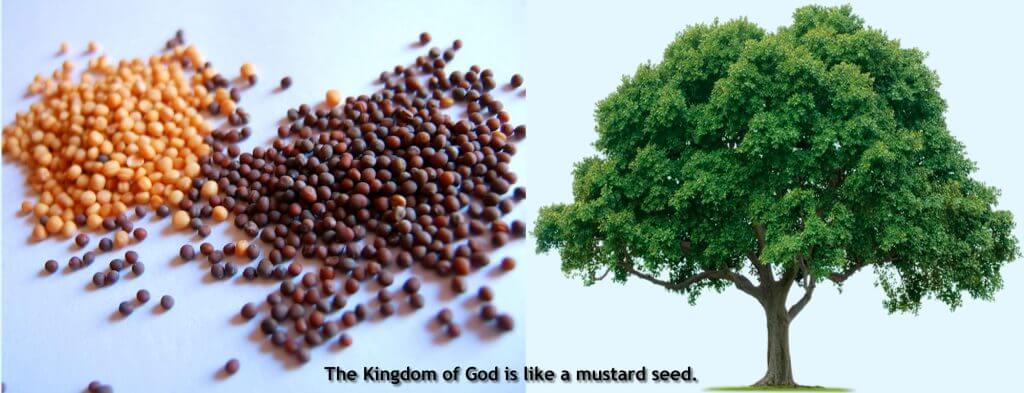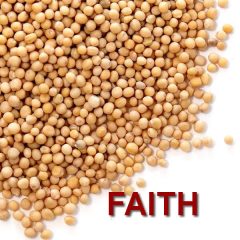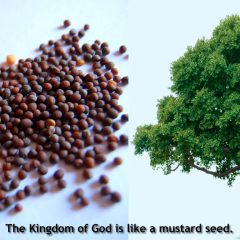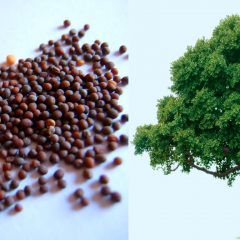mustard seed
Not How Much Faith, But Where It’s Planted

27th Sunday Ordinary Time – Year C
Fr. Joonbin Lim
Preached: October 5, 2025
In today’s Gospel, the apostles come to Jesus with a very human request: “Lord, increase our faith.” How often do we say the same?
We wish we had stronger faith, faith that would help us overcome doubt or difficulty. But Jesus gives a surprising answer: “If you have faith the size of a mustard seed, you could say to this mulberry tree, ‘Be uprooted and planted in the sea,’ and it would obey you.”
Faith, Jesus tells us, is not about quantity but authenticity. Even the smallest faith, if it is real and rooted in God, can do what seems impossible. What matters is not how much faith we think we have, but in whom our faith is planted.
When I hear this passage, I think of my own journey of faith. By nature, I am someone who relies more on reason than emotion. For years, I tried to understand God through study and reflection. But over time I realized — God cannot be fully understood by reason alone.
When people speak of “experiencing the Holy Spirit,” I find it hard to believe. I said, “Yes, I believe,” but deep inside I wasn’t sure. Faith was in my head, but it hadn’t yet reached my heart.
Before my priestly ordination, I went to Louisiana for an Ignatian silent retreat. There, during days of silence and prayer, I experienced the Holy Spirit in a deep and powerful way. It was not a vision or a voice, but a profound peace and joy that touched the core of my heart. I knew then that the Holy Spirit is real and alive, and that He works within us.
But how can we know if what we experience truly comes from the Holy Spirit? For that, we can turn to St. Ignatius of Loyola, who teaches us the discernment of spirits. He said that there are two kinds of movements within us: one from the good spirit, leading us closer to God, and one from the evil spirit, pulling us away from Him.
So we must look at the fruit our experiences produce. If they bring peace, humility, love, and hope — they are from the Holy Spirit. But if they lead to pride, confusion, or self-centeredness — they are not from God.
That’s how I knew my own experience was real. It moved me to love God more deeply and to serve more faithfully. It was not only a feeling but a call — a conversion of heart.
Since then, I have come to see faith differently. Faith is not about understanding everything, but trusting that even when we cannot see, God is working through us.
That’s why Jesus connects His teaching on faith with the parable of the servant. Faith is not about showing power or success, but about humble service. True faith does not say, “I have done this,” but “The Lord has worked through me.”
When the servant has done all his work, he says, “We are unworthy servants; we have only done what we ought to have done.” So too, our faith is fulfilled not in achievement or recognition, but in receiving all as grace and giving all glory back to God.
We are called to serve God and one another, not as slaves who work from fear, but as free servants who follow our Master with love. Not for reward, but because being faithful to Him is itself our dignity.
The apostles wanted faith that would bring power, but Jesus desired faith that brings humility and fidelity. He did not choose the strong or the perfect, but those willing to follow sincerely, even in weakness.
Faith, then, is not the assurance of what I can do, but the trust that everything I do is held within the grace and power of God. Even a mustard seed of faith, when rooted in God, can bear great fruit.
But the fruit is never our achievement — it is always God’s grace.
Let us remain faithful servants, humble and grateful, and we will find our deepest joy in Christ Himself.
Where Will You Find God?

11th Sunday Ordinary Time
Fr, Mark Gatto
Preached: June 16, 2024
Where would you look to find God in our world today? If someone asked you where they might find God, where would you send them?
Jesus tells the parable of the mustard seed, the Kingdom of God is like this tiny, small seed, yet it grows into a large tree that provides much coverage. God is at work, the Kingdom of God is in our presence, even when we do not see it, when we do not feel it. Often it is in the smallest, the most silent, the least known ways and places. We need to see with the eyes of faith.
If we are looking for God in the biggest story, the most important people, in the youtube or facebook page that has gone viral, we will probably miss the grace of God. If we look for God in the richest, the most powerful, the most important, then we will probably miss the grace of God. Look for God in the smallest, least important, seemingly unimportant in the eyes of the world.
See parents sacrificing and caring for their children. You will not see this in the news, it is not a big thing, yet it brings something good into our world.
See grandparents praying for their grandchildren and bringing them to church, it is not a big thing, it seems small, yet it produces something good in our world.
See a friend who is quietly supporting a friend going through a hard time. It might not be noticed by others, it is not a big thing, but it brings something good into our world.
One person choosing to be honest, it may not be noticed by anyone, it might seem to be a small thing, yet it produces something good in our world.
The elderly person sitting at home alone but praying quietly, it might not be noticed, it is not a big thing, yet it produces something good in our world.
The child with autism, seems unimportant to the eyes of the world, yet in that child we may also see the grace of God.
All of these seem small, they are not noticed, yet God takes these and brings something much larger out of them. We need to see with the eyes of faith.
There is a line in the famous poem of Gerard Manley Hopkins that says, “The world is charged with the grandeur of God.” As Catholics we should see all in the world as filled with the grace of God. Often we walk through life missing the grace of God. We are so busy, rushing so much, distracted by many things. We miss the grandeur of God in all the incredible ordinary moments of daily life.
Our Catholic Sacramental vision points out that everything in this world is a potential path to God. But, only if we notice the Kingdom of God in the tiny mustard seeds.
What will help us to recognize the grace of God in each moment, in each place, in each person? A life of prayer should help us to have eyes of faith. But it is not about saying prayers, it is about living in prayer.
Today I want to speak about one simple prayer that may be helpful to us to live in prayer. It is called the Jesus Prayer. You simply repeat this simple prayer as you are walking or as you are driving or in any place. “Jesus Christ, Son of God, have mercy on me, a sinner.” When you do not have time for longer prayers. When you find it difficult to pray, in your heart simply repeat this prayer. “Jesus, Son of God, have mercy on me.”
This may help keep our eyes open to recognize the grace of God around us wherever we are. We might even be surprised by joy and gratitude in the smallest moment, the simplest person, the most ordinary place.
So, if your are looking for God, begin right where you are, with the person in front of you. Live in prayer so that you will see the grace of God in each moment, in each place, in each person. They are the mustard seeds of the kingdom of God.
Where Is God?

11th Sunday In Ordinary Time
Fr. Mark Gatto
Preached: June 13, 2021
Churches closed for Mass, rainbow flag disputes, residential school tragedy, four Muslims killed in an act of hate. We might be asking, is God at work in the world and church today? If so, where?
In particular, it has been a difficult time for the Catholic Church, for us Catholics, particularly in Canada. There are many reasons for discouragement, even for shame. Many have wanted to speak to me about some of these issues and I sense the struggle of many.
We might be asking, is God at work in the world and church today?
For most of 2021 our churches have been closed due to a once in a life time world wide pandemic. We have been unable to gather for the Eucharist on Sunday, something so central to our faith and our communion as the body of Christ. Many of our parishioners who have never missed Sunday Mass in their entire life, have now been unable to come for months.
Where is God at work in this moment in history?
Second, in the past few weeks there were disputes and struggles over the flying of the rainbow flag at our Catholic schools. Some boards have agreed to this and some boards have not. Some people are very upset with the idea, others are very upset that it would not be allowed.
Where is God at work in this moment in history?
Third, we had the terrible news of the unmarked graves of children at the former Kamloops Residential School. As a Church we were confronted with one of the really sad chapters in our history. There is a certain shame that our Church could be involved in such a terrible system.
Where is God at work in this moment in history?
Fourth, a young man in an act of hate drove over a family of Muslims killing four of them. All of Canada is faced with the reality of racism and prejudice within our country capable of instilling such hatred. Where is God at work in this moment in history?
Jesus uses the image of a man who scatters seed in the ground, then while he is sleeping, the seed sprouts and grows without his knowing how. God is usually at work bringing new life while we are sleeping. We often do not even recognize what God is doing in the world or the church. It is happening in quiet and hidden ways.
Jesus also uses the image of the mustard seed, the smallest seed that eventually grows into a large shrub whose branches provide nests for birds. God is often at work in the smallest, simplest way that we do not think is important.
The work of God in our world and church often goes unnoticed. It is often in small and quiet ways that God is bringing change and healing.
So, what do we do in the midst of these challenging times for the Church and for us as Catholics?
Where do we find God at work in such situations?
Begin by a good self-examination. In what ways can I be an instrument of God’s grace. How can I join what God would want to be doing in this moment of time?
Begin by looking at our words. How do I speak about other people? How do I speak about other religions? How do I speak about people who are different in any way? Is my way of speaking leading to hatred or division? Or is my way of speaking leading to peace and healing?
Is the way I speak reducing the dignity of others or is it leading to deeper recognition of the dignity of others?
We need to examine honestly the way that we see others. Do we see other races, other religions, other cultures, other minorities in a way that reduces their humanity?
This is the challenge for the Church in this moment and so the challenge for each one of us as Catholics.
Where is God at work in this moment in history?
Look at yourself and honestly reflect if your words and actions would truly be in union with what God would want to be doing in this moment.
Does the way I see others, the way I speak of others increase their dignity and lead to peace?
God is at work even when we are sleeping, even when we do not see any signs of that work of God. Even the smallest acts of goodness, the smallest words of kindness, are able to be like that smallest mustard seed bringing forth the kingdom of God in our midst.


